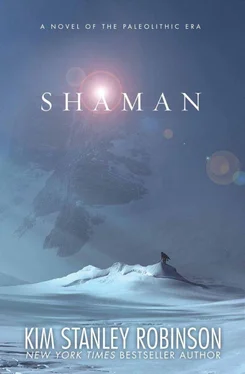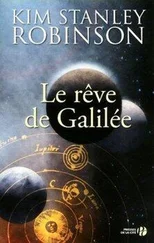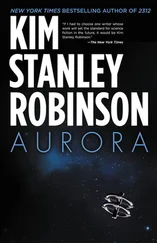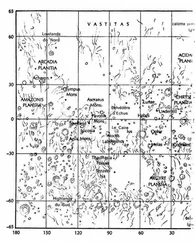Then an afternoon came when Elga fell on the snow, and was very slow to get back up. Loon got off the sled, so much shorter and lumpier now, and hopped over to her, feeling terrible. He saw all of a sudden that she was emaciated, sunburned, almost too weak to get back up. She had walked herself into the ground without saying a word about it.
—No! Loon said, when she finally stood and tugged on the sled lines.—Now it’s my turn.
He took the harness off her and put it around his waist. Between his walking poles and his legs he had become a four-legged creature, in form not unlike a hyena, high-shouldered and ugly. But still he could hop along, hauling Badleg and making it help whenever he could manage it. Elga limped behind him in the shallow trench over the snow that the sled made.
By now none of them were walking very well, but they were moving at about the same pace as each other. They stumped along wordlessly, and made camp earlier each day, and hunted for bulbs as well as firewood, and at night slept on dry ground, or dry stone slabs, warm in the fire’s heat.
Finally a day came when they all were failing. On that day it was Badleg who saw them through, having the only muscles among them not completely tapped out. As Loon walked it was now Badleg who gave the most push, painful though it was. So sometimes Loon hauled the sled by itself, sometimes with Thorn on it, once even with Elga, who wept with frustration to have to lie down and be pulled. But Loon insisted. Badleg was fresh compared to them, and Loon quickly learned to contain the pain to a little stab of agony that burned at a single point in every step, a pain to be ignored as an unwelcome guest, an intruder, someone to thrust past unacknowledged time after time, like a hyena or a pike. Step after step this attitude worked, almost. His third wind, or some wind beyond the third wind, had come into him, and he gritted his teeth and felt the strength, still there in the parts of Badleg that didn’t hurt. Even Goodleg was not as strong as Badleg now.
I am the third wind
I come to you
When you have nothing left
When you can’t go on
But you go on anyway
In that moment of extremity
That afternoon they ascended a forested snowy slope to a bare ridge running southwest to northeast, resting every three or four steps. On the ridge Thorn shaded his eyes with a hand, staring east.
Suddenly he said,—Here now, what’s that?
He pointed.—See that peak just over the horizon there, over those trees? That’s Ice Cap South. Puy Mir.
—Are you sure? Loon couldn’t help saying.
Thorn kept staring. Then he looked at Elga and Loon and smiled. It was like seeing a snake smile, unexpected and repellent, but a smile nevertheless.
—I’m sure.
The idea that they knew where they were did a lot to restore their spirits, of course. But their problems were by no means over, because Ice Cap South was well to the west of their camp, and all the rivers and even the creeks were now broken up and running high. No more crossing ice, which was a relief given the break-up they had seen; but they were too weak to cross streams at any ford higher than their ankles. Camp lay to the east of them, but the ravines here ran northeast to southwest, so they often had to walk across the grain of the land, and cross creek after creek. Usually the best way over these little creeks was a tree that had fallen across them. As he didn’t trust Badleg’s balance, Loon found these logs about as frightening as any ford. On every crossing he sat down and scooted himself across the fallen trees, or crawled, even if they were logs so thick that ordinarily he could have crossed them standing on his hands. Meanwhile Elga and Thorn, who had recovered a little, had to cross while grabbing the two ends of Click and lifting his body, like a fur-wrapped log, over and between branches sticking up. Loon could do nothing to help them with this.
Now also, as the days were warming to well above freezing, from about midday to just after sunset, poor Click was thawing a little in the afternoons, then refreezing at night. His meat was therefore going off. Thorn spent a final session with him, one night after they chewed on some of his ribs, and came back to the fire with three last bags of meat that he thrust into a snowbank near them.
—You can walk all the time now? he said to Loon.
—Yes, Loon said, hoping it was true.
—Good. Tomorrow we’ll leave him. We can come back later and give his body a proper burial.
He took Click’s leggings from one of the bags and put them on the fire to burn, chanting the good-bye farewell to Click’s spirit:
Now you are gone, we loved you
Now you are gone, we thank you
Now you rest in the sky above
And we will always remember you
After another cold night bundled together by the fire, a night unvisited by Click, they woke to a cold north wind. This was very unfortunate; wind was by a long way the worst of their foes; snow would have been better, even rain. Their luck seemed to have left them entirely, perhaps because of their treatment of Click, but anyway: bad.
When they were as bundled up as they could get, they went together to the remains of Click’s body, hauled it to an area of south-facing rocks, and laid it out for the birds. Already black buzzards scrapped around overhead in the gale. Thorn sang the funeral song and made a promise to Click to return and collect what bones might remain, for proper disposal when the time was right.
Then they took off on their own.
Now Loon walked as much as he could on his poles, but of course Badleg had to do its part, there was no way around it. Whenever they were on remnants of snow in the afternoon, it still helped to be on their snowshoes, and that involved Badleg no matter what. Loon just had to stride over that little click of agony. It was an almost audible click. Indeed in the mornings, when he was stiff and it was quiet, he could actually hear the click as he felt the pain jolt up him. It was very like one of Click’s little click words, and so it began to seem to Loon that Click had taken over from Badleg, and from Crouch, and had now settled in their place. Click had moved into him to protest the bad treatment he had received from his comrades after his death, or perhaps to help him along. Step by step Click clicked in him.
Thorn kept a steady slow pace, although whenever he approached a ridge that looked like it was going to give him a view east, he hurried up it with a speed that suggested to Loon that the old man still had a little reserve of strength. Elga was slower, and Loon could see that she was wearing down. She had eaten all she could of her own fat, and was now as thin as she could get. But she was stubborn too. He knew that now full well, and could see it clearly in the set of her shoulders, and the deep wedge between her eyebrows, and the look in her eye. She was not going to stop now that they were so close.
So really it came down to a matter of isolating Click to his single objection, the same stab over and over again, and then getting along without any more hurt than that. Over wet ground, over rocks, over big suncups when they could not be avoided; they were getting really bad, whether hard in the mornings or soft in the afternoons. Up ravines and over passes, sometimes following animal trails, with some human trail signs too. Keeping a general aim east. From every high point they stared east hungrily, and Thorn would point at something he recognized, and on they would go, down again toward the next creek crossing, the next up, the next pass.
That night by the fire they ate the last of Click’s flesh, and Thorn built the fire larger even than usual and warmed his hands at the flames, dancing just a little in place.—Tomorrow we’ll be there, he said.
Читать дальше











